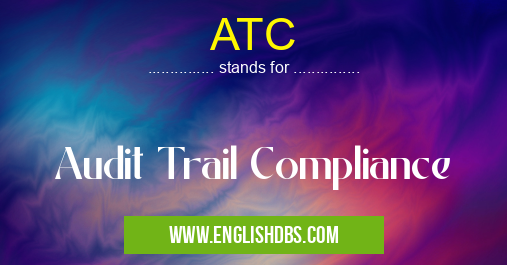What does ATC mean in AUDITING
ATC stands for Audit Trail Compliance. It refers to the adherence to regulations and standards that require organizations to maintain a chronological record of all activities and transactions within their systems. This record provides a comprehensive history of user actions, system changes, and data modifications.

ATC meaning in Auditing in Business
ATC mostly used in an acronym Auditing in Category Business that means Audit Trail Compliance
Shorthand: ATC,
Full Form: Audit Trail Compliance
For more information of "Audit Trail Compliance", see the section below.
Definition of ATC
ATC ensures the integrity and accountability of data by creating an auditable record that can be used for security, compliance, and forensic investigations. It involves the collection, storage, and analysis of audit trails to detect unauthorized access, data breaches, and other security incidents.
Functions of ATC
- Record Keeping: ATC systems maintain detailed logs of user activities, system events, and data modifications.
- Compliance Reporting: ATC helps organizations demonstrate compliance with regulatory requirements, such as HIPAA, SOX, and GDPR.
- Security Monitoring: Audit trails provide a valuable source of information for security analysts to identify suspicious activities and potential threats.
- Forensic Analysis: In the event of a security incident, audit trails can be used to reconstruct events and identify the responsible parties.
Implementation of ATC
Implementing ATC requires organizations to establish policies and procedures for audit trail generation, storage, and management. This includes:
- Defining the scope of audit trails (e.g., which systems and applications are covered)
- Determining the level of detail required for audit trails
- Establishing retention periods for audit trails
- Ensuring the security and integrity of audit trails
Benefits of ATC
- Improved Security: ATC enhances security by providing a detailed record of activities, making it easier to detect and investigate unauthorized access.
- Compliance Adherence: ATC helps organizations meet regulatory requirements and avoid penalties for non-compliance.
- Increased Accountability: Audit trails assign responsibility for actions and data modifications, promoting accountability within the organization.
- Reduced Risk: ATC provides evidence to support investigations and can help reduce the risk of reputational damage and financial losses.
Essential Questions and Answers on Audit Trail Compliance in "BUSINESS»AUDITING"
What is ATC (Audit Trail Compliance)?
ATC refers to the adherence to regulations and standards that mandate the recording, review, and retention of system events and user activities within a computer system or network. It ensures the integrity, accuracy, and traceability of digital records for regulatory, legal, and security purposes.
Why is ATC important?
ATC plays a crucial role in maintaining the integrity of digital records, providing evidence for regulatory compliance, and facilitating investigations into security incidents. It ensures that system events and user activities are recorded accurately, enabling organizations to track changes, detect unauthorized access, and reconstruct events.
What are the benefits of ATC?
Implementing ATC offers several benefits, including:
- Improved security and reduced risk of data breaches
- Enhanced data integrity and reliability
- Compliance with industry regulations and standards
- Facilitated incident response and forensic investigations
- Increased accountability and transparency in system operations
What regulations require ATC?
Various regulations and standards mandate ATC, such as:
- HIPAA (Health Insurance Portability and Accountability Act)
- PCI DSS (Payment Card Industry Data Security Standard)
- GDPR (General Data Protection Regulation)
- SOX (Sarbanes-Oxley Act)
- ISO 27001 (Information Security Management System)
What are the key components of an ATC system?
An effective ATC system consists of:
- Audit trail generation: Recording system events and user activities in a secure and tamper-proof manner
- Audit trail storage: Retaining audit trails for the required period, as specified by regulations or organizational policies
- Audit trail review: Regularly reviewing audit trails to identify potential security breaches or compliance violations
- Audit trail analysis: Using tools and techniques to analyze audit trails and extract meaningful insights
How can organizations implement ATC?
Implementing ATC involves several steps:
- Identifying applicable regulations and standards
- Establishing policies and procedures for audit trail generation, storage, review, and analysis
- Selecting and deploying an audit trail management solution
- Training staff on ATC requirements and best practices
- Monitoring and reviewing ATC systems regularly to ensure compliance and effectiveness
Final Words: ATC is an essential component of a comprehensive security and compliance strategy. By maintaining a chronological record of activities and transactions, organizations can ensure the integrity of their data, adhere to regulatory requirements, and mitigate security risks. Implementing and managing ATC effectively is crucial for protecting sensitive information, demonstrating compliance, and ensuring the trustworthiness of an organization's systems.
ATC also stands for: |
|
| All stands for ATC |
